Marine Life & Conservation
Fish Conditioning: Do fish become conditioned by contact with divers?
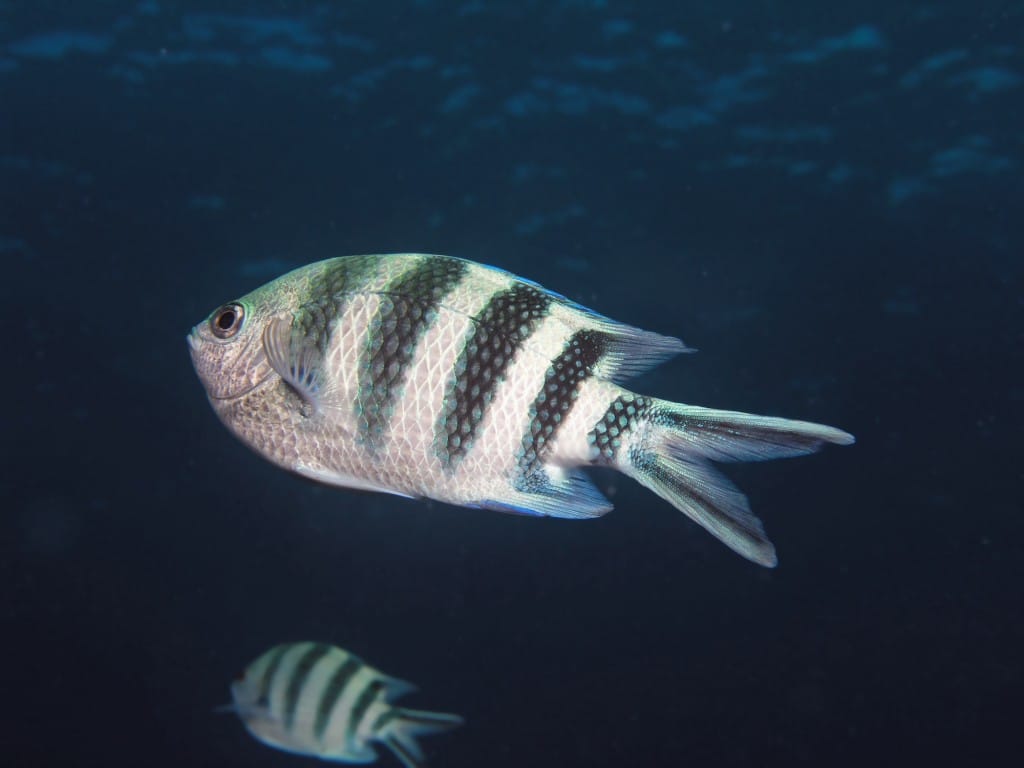
In Mauritius, some of the species are completely relaxed, and others extremely nervous around divers. The most remarkable are the sharks in the shark pit in Mauritius. We have been there with a small group to find as many as 23 sharks finning around in the washing machine current. To them we do not exist. They completely ignore us.
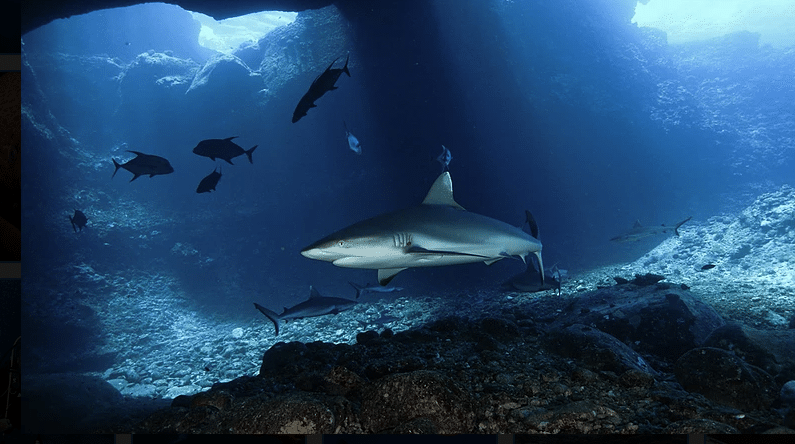
Once they have got used to the fact that the air-breathers are harmless they go about their business happily, unafraid of the invaders.
In Mozambique the Potato Bass are happy to interact with divers, lying on the sand, eyeing them hopefully, swimming beside them and rubbing against them. The legendary Bert was among these.
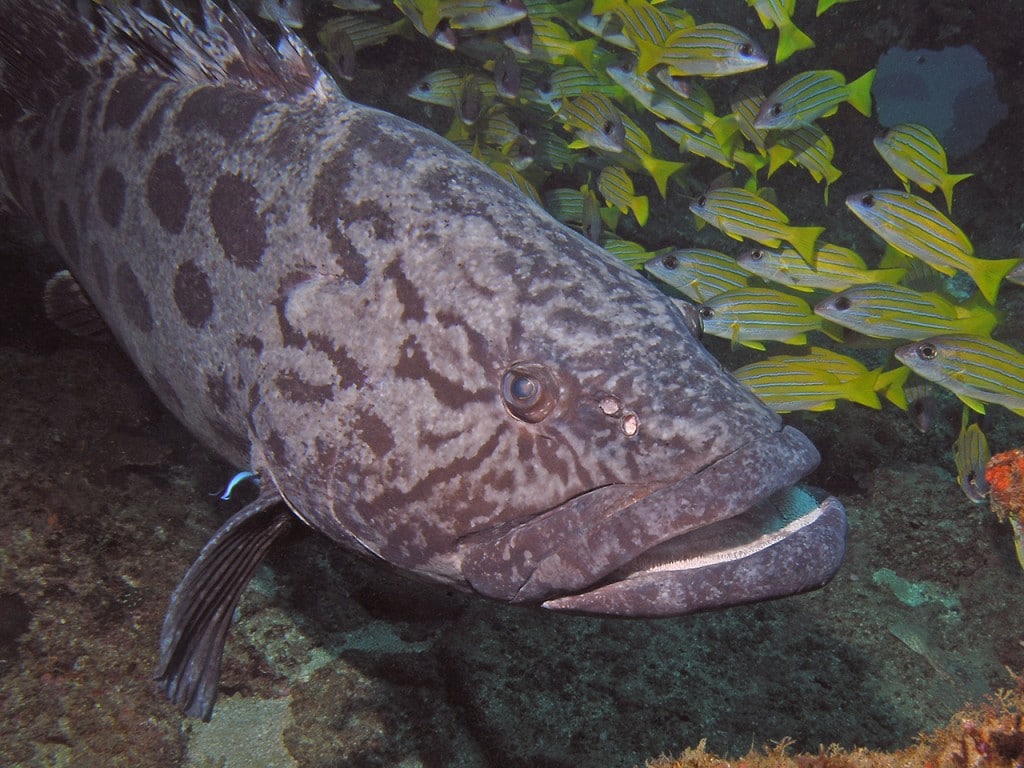
The controversy over Cage Diving and chumming for sharks rages on, and although we enjoy the adrenalin rush of the Tiger Shark Dive at Aliwal Shoal, there is always a nagging doubt that we are supporting something that could lead to later danger. It is extremely rare for a diver to be attacked by a shark, unless he is in a bait ball or in the wrong place, or behaves foolishly. The Dive Operators who offer these extreme experiences have never themselves felt in any danger.
The raggies at Aliwal shoal are like bull terriers. They are completely familiar with divers, and they are unfazed by photographers. The pregnant females at Sodwana fin trance-like around groups of divers.
I watched Walter Bernardis brush a piece of sardine away from my buddy’s head just as a Black Tip was diving for it, and the Black Tip veered away from his hand. Shark diving is exhilarating, but I have never felt threatened by the animals themselves. After five years of diving with the Tigers, I have noticed that the grey reef and black tips that come to feed are no longer wary of divers. They brush you out of the way to reach the bait ball. Once they lose their fear of divers, these sharks are completely relaxed in the water.
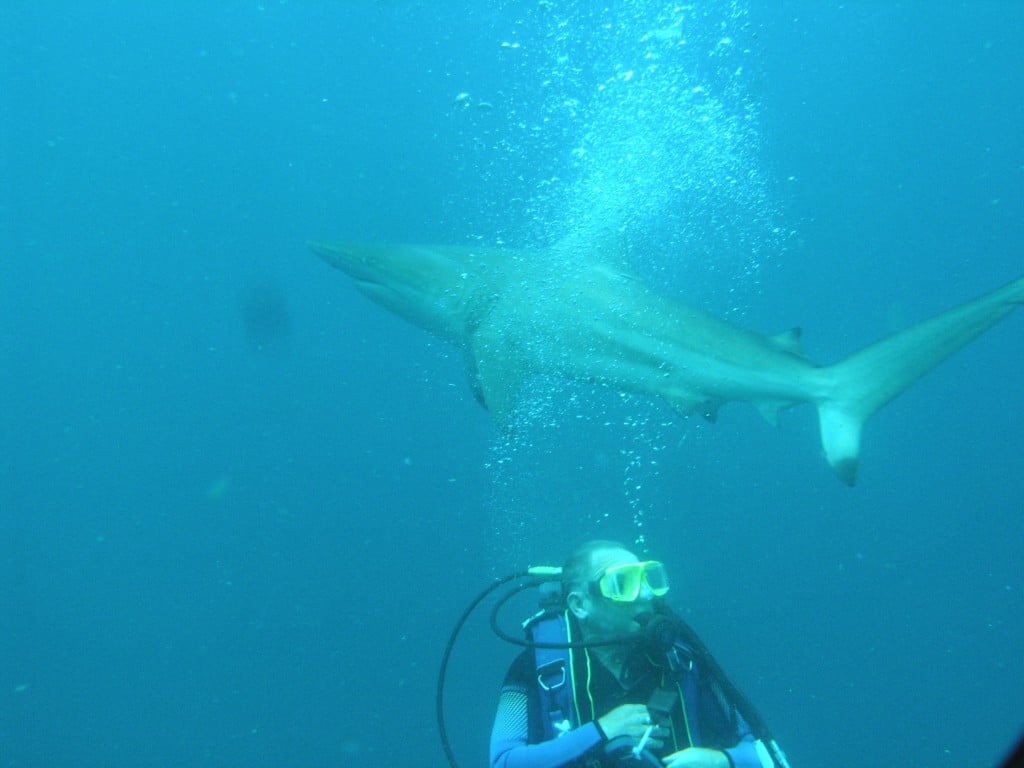
The one animal that always seems completely aloof, has never changed, and which completely ignores diver and which typifies the apex predator is the Tiger. Nothing changes their behaviour that I have ever seen. They are always looking for something to taste. They are always alert to anything new in their world. They will always nibble on anything unfamiliar, and a nibble from a tiger can remove most of your torso.
Is it a bad thing for fishes to become conditioned to the presence of divers in their private domain? Theoretically, anything that changes the behaviour of a creature in its natural habitat is unwarrantable interference. However, the test of stress in a creature is whether it continues to live, to eat and to breed and the evidence of stress-free fish life is everywhere.
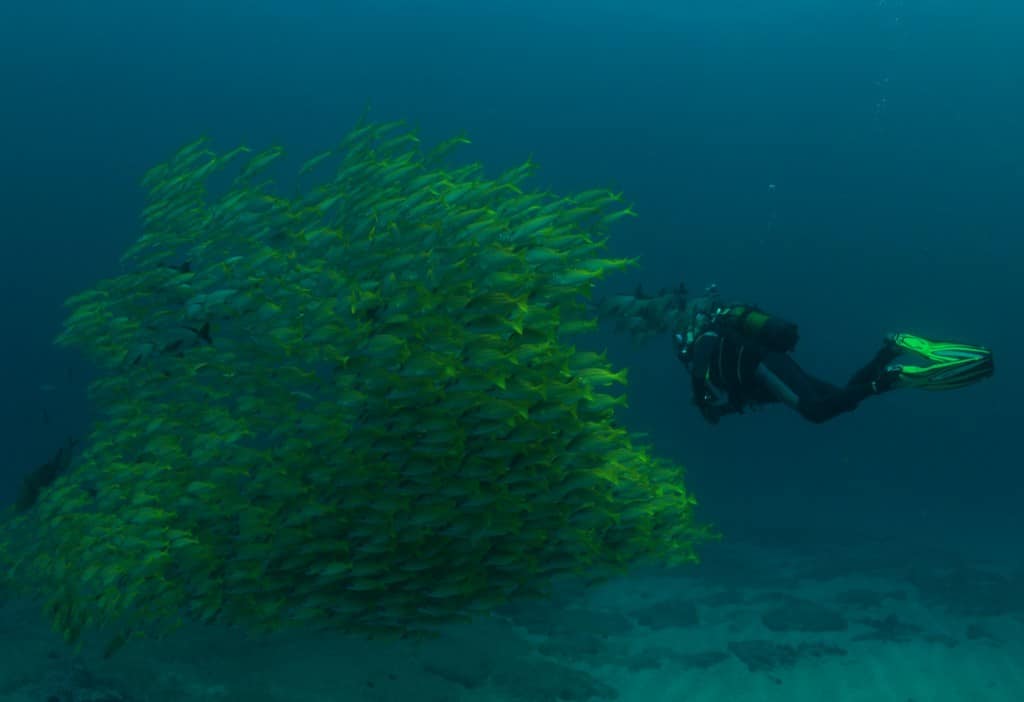
In the bad old days, Dive Masters in Mauritius used to conceal pieces of uneaten cheap Government bread in their BC pockets. Unnoticed by the early naiive Resort Course divers, the DMs crumble the bread into the water around them, and are soon mobbed by shoals of damsels, who like nothing more than a little French loaf for breakfast.
When you dived with certain Dive Operators there you had to swat away the aggressively seeking damsels. They bit your hands or the naked areas on your face. Their teeth are too small to draw blood, but the nip was painful nonetheless. Conditioned to expect something from divers? Absolutely.

At Sodwana Bay on Stringer Reef and on Quarter Mile Reef the Sergeant Majors (Abdadufduf abdadufduf ) lay their eggs in nests in the hollows of the eroded rocks and caverns. In December they can be seen hovering anxiously over their nests, but if a diver gets too close they dart away, and the wily wrasses pile in and gobble their eggs.
Incredibly, the Wrasses know they fear divers, and we have often been plagued by colourful wrasses weaving seductively in front of the camera lens, and then darting towards the Sergeant Majors’ nests hoping we will follow them. It’s almost as though they are saying, “Come on guys, come and look at these eggs, come and photograph these fish.” We have often seen pairs of mournful-looking Sergeant Majors rushing back to their eggless nests after an oblivious dive group has finned down for a closer look.
Conditioning? Looks like it.
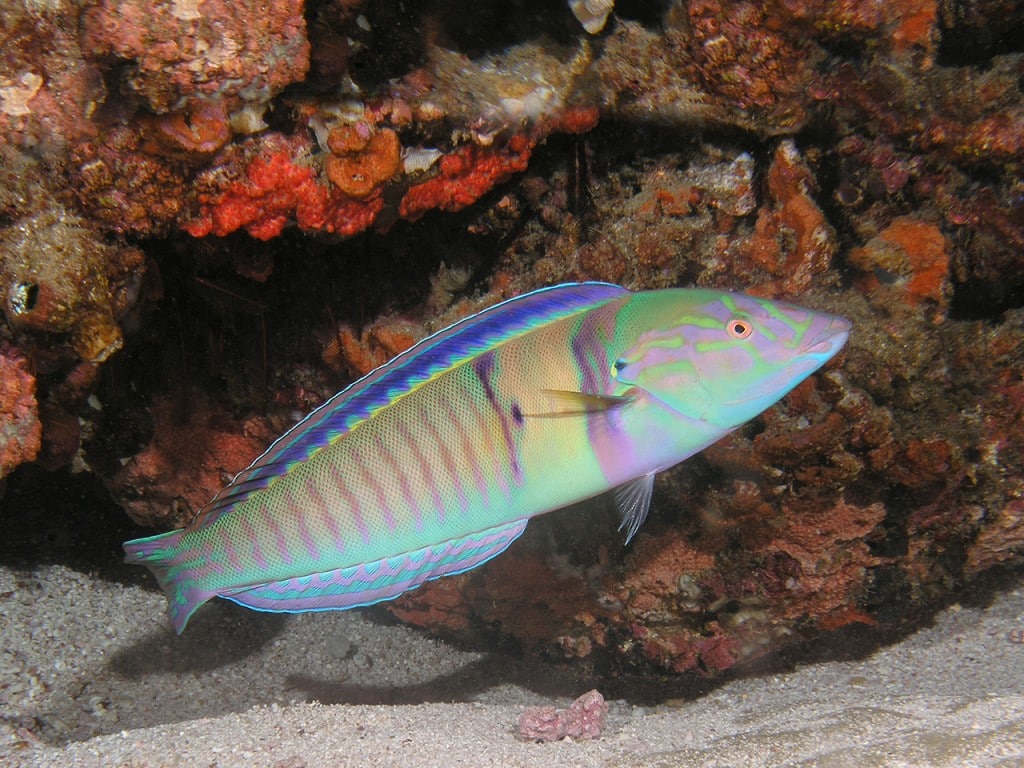
Less obvious conditioning is on new or undiscovered reefs, where the fish are much more nervous when a group of divers arrives, and whole shoals will fin away from the intruders. I’ve seen this happen at little –known Reefs like Fusilier, or Snapper College at Sodwana.
Perhaps, just as we are learning about Reef Fish, they are learning about us – and if their behaviour is anything to go by, once they get to know us, they simply accept us.
Words Jill Holloway
Pic David Holloway
Copyright Ocean Spirit
Marine Life & Conservation
Paul Watson Released as Denmark Blocks Japan’s Extradition Bid

Renowned anti-whaling activist Paul Watson has been released from custody in Greenland after spending five months in detention. Denmark’s Justice Ministry rejected Japan’s request for his extradition, citing insufficient guarantees that his time already served in custody would be credited against any potential sentence.
The 74-year-old Canadian-American was arrested on July 21 in Nuuk, Greenland’s capital, when his ship docked to refuel. His arrest was based on a 2012 Japanese warrant related to a 2010 encounter in Antarctic waters. Japan alleged Watson obstructed operations and caused damage to a whaling research ship during efforts to disrupt illegal whaling. Watson has consistently denied these claims, maintaining his commitment to marine conservation.
Denmark, which oversees extradition matters for Greenland, concluded that while the legal conditions for extradition were met, the lack of assurances from Japan regarding time-served credit made extradition untenable.
In a video shared by his foundation, Watson expressed gratitude and relief, saying, “After five months, it’s good to be out… and good to know they’re not sending me to Japan.” He added that the most difficult part of his time in custody was being separated from his two young sons.
Watson is a pioneering figure in marine conservation, known for founding the Captain Paul Watson Foundation in 2022 after decades of activism with the Sea Shepherd Conservation Society. His bold efforts to defend marine life have earned him widespread support, including from celebrities and conservationists. His work has also been featured in the acclaimed reality TV series Whale Wars.
Watson’s lawyer, Jonas Christoffersen, praised the decision, stating, “We are happy and relieved that Paul Watson is now free.” He added that Watson is eager to reunite with his family and continue his vital work.
The arrest occurred while Watson’s vessel, the M/Y John Paul DeJoria, was en route to the North Pacific with a team of 26 volunteers to intercept a Japanese whaling ship. His foundation described the arrest as politically motivated and emphasized that Watson’s actions were focused on ending illegal whaling practices.
Japan resumed commercial whaling in 2019 after leaving the International Whaling Commission, asserting that whale meat is a cultural tradition. Conservationists, however, continue to challenge these practices, highlighting their impact on marine ecosystems.
Despite the challenges, Watson remains steadfast in his mission to protect marine life and bring attention to whaling practices. His dedication to ocean conservation has made him a globally respected advocate for the environment.
Marine Life & Conservation
12 Days of Zero-Waste Fish-mas

This holiday period, the Marine Conservation Society, the UK’s leading ocean membership charity, invites you to make some simple changes to eating fish this Christmas to help our seas.
Dr Kenneth Bodles, Head of Fisheries and Aquaculture at the Marine Conservation Society, said, “During the festive season, our consumption increases, but so does waste. Sustainability isn’t just about where food comes from – it’s also about how you use it. By reducing waste and making the most out of your seafood, you’re not only taking steps to be more ocean-friendly, but can also help to cut costs during what is often one of the most expensive times of the year”.
The Marine Conservation Society has compiled twelve tips on how to consume seafood sustainably with zero-waste this Christmas:
Buy whole fish instead of fillets
Instead of fillets, consider buying whole fish such as salmon, hake, or lemon sole. By adopting a “nose to tail” approach with cooking, whole-baked fish not only feeds a crowd, but also helps to minimise waste and maximise sustainability by using up every part of the animal, including bones, skin, and fat.
Make fish stock
Leftover fish bones or shells can be put to good use by boiling them to make a nourishing fish stock or bisque. This can be frozen and preserved for later use and makes for a flavourful base in a soup.
Make your own fish pâté
Avoid waste by turning leftover fish, such as smoked mackerel or salmon, into a delicious pâté by blending with cream cheese and lemon. Perfect when paired with crackers.
The sustainability of salmon and mackerel varies depending on where and how it is caught or farmed. For more information on green-rated options, check the charity’s Good Fish Guide.
Buy frozen
By purchasing seafood that is frozen or vacuum-packed, this helps to reduce waste by extending the shelf life of your food.
Fish pie
If you’re wondering what to do with leftover cooked fish, why not opt for a classic fish pie with mashed potatoes, leeks, and a cheesy sauce? A sure crowd pleaser on Boxing Day.
Use the head
Don’t forget the fish head! The meat is incredibly tender and flavourful. The charity recommends a cod’s head curry or recreating Fallow’s renowned cod’s head in siracha butter.
By stretching your ingredients further, not only is this a more sustainable way to enjoy seafood, but also cost-effective by repurposing leftovers and cooking creatively.
Boxing Day brunch
Mix leftover kippers or smoked salmon with scrambled eggs for a tasty, zero-waste, Boxing Day brunch.
For best choice, make sure you buy kippers, or herring, from the North Sea and the North Irish Sea.
Zero-waste storage
A top tip from the Marine Conservation Society to avoid waste is freezing fish offcuts to save for future use.
Crisp up the skin
Even leftover fish skin can be turned into a quick savoury snack by crisping it up in an air fryer with a little olive oil and salt.
Anchovies two ways
Leftover anchovies can either be blended with butter to make a delicious anchovy butter or tossed into pasta for a hit of umami flavour.
The charity recommends opting for anchovies caught in the Bay of Biscay for best choice.
Fishcakes
For an easy, zero-waste meal, leftover seafood trimmings can be mixed with mash and fried in breadcrumbs to make fishcakes.
Pickled mussels
Try pickling mussels in 1:1 vinegar and water, with a dash of sugar for a sustainable, zero-waste snack that can be enjoyed well beyond the festive season.
Mussels farmed in the UK are a seafood superhero. Grown using low-impact methods and harvested by hand, they get all the food they need from the sea around them. This makes them one of the most sustainable, ocean-friendly, and cost-effective seafood options.
Players of People’s Postcode Lottery have raised £6.6M towards the Marine Conservation Society’s vital work in making seafood more sustainable.
Laura Chow, Head of Charities at People’s Postcode Lottery, said: “Fish is a festive favourite for many, but making sustainable choices when it comes to how we buy and eat seafood makes all the difference for our ocean. Support from players of People’s Postcode Lottery has helped the Marine Conservation Society further its sustainable seafood work, so that we can all enjoy healthier, better protected seas.”
The Marine Conservation Society encourages you to make sustainable seafood choices a year-round habit, not just for Christmas. To check how sustainable the seafood on your plate is, you can visit the charity’s Good Fish Guide. The Guide helps consumers and businesses identify the most sustainable seafood using a simple traffic light system, based on where and how species are caught or farmed. Green is the best choice, amber means improvements are needed, and red indicates fish to avoid buying.
Zero-waste gift idea
Why not embrace a zero-waste Christmas by gifting a membership to support marine conservation? It’s a meaningful, low-waste gift that helps protect our ocean for generations to come. Memberships start from as little as £5 a month – the price of a sandwich and drink from your local coffee shop.
Find the latest sustainable seafood advice for wild-caught and farmed seafood on the Good Fish Guide, downloadable to your phone from www.mcsuk.org/goodfishguide.
-

 News2 months ago
News2 months agoIconic SS United States to become the World’s Largest Artificial Reef
-

 News3 months ago
News3 months agoBook Review – 52 Assignments: Underwater Photography
-

 Gear News3 months ago
Gear News3 months agoDYNAMICNORD – New German diving brand enters the British market
-

 News3 months ago
News3 months agoExploring Cenote El Pit: A Diver’s Dream
-

 Gear News3 months ago
Gear News3 months agoTry BARE drysuits (and maybe even win one!) this Friday with Sea & Sea at North West Dive Fest
-

 Marine Life & Conservation3 months ago
Marine Life & Conservation3 months agoBook Review: Coral Triangle Cameos
-

 Blogs2 months ago
Blogs2 months agoDive the Egyptian Red Sea this Autumn with Regaldive
-

 News3 months ago
News3 months ago2024 Ocean Art Underwater Photo Competition Announced



